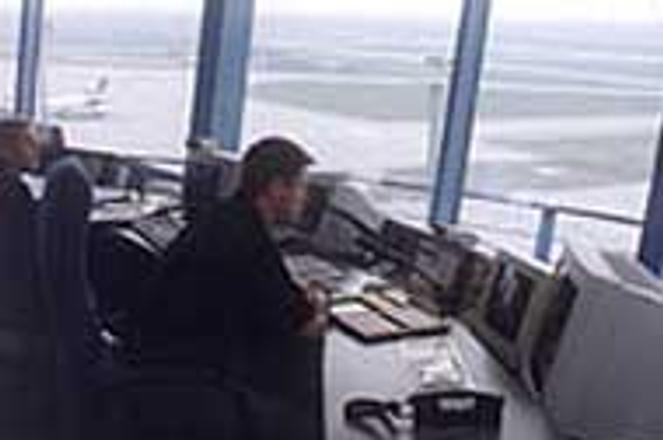Air traffic control is one of the areas that may be affected by the Millennium Bug, but controllers say they are ready to deal with any unforeseen problems.photo: Courtesy of Air Traffic Control
As the clock counts down to the millennium, computer experts warn that the "century date change problem" (also known as the "Millennium Bug" or "Y2K") could wreak havoc on unprepared computer systems and programmes worldwide. Globally, Y2K disaster scenarios vary from the trivial - mobile phones on the fritz - to serious problems like air traffic control systems failures. In Slovakia, experts say, everything will depend on how well companies prepare for the turn of the century.
David Lyscom, the British Ambassador to Slovakia and the author of "UK note on the Millennium Bug", warns that Y2K bug-related problems could have devastating effects on unprepared countries. "The effective operation of governments, companies and other organisations worldwide will be threatened as we approach the turn of the century," he writes. "Computer-based systems important to the proper functioning of national infrastructures are at risk."
With only ten months to go until the year 2000, some experts say that the window of opportunity for Y2K preparations is closing, while others maintain it is already too late for firms that have not begun to protect themselves.
"I think that you can compare the situation to tax-returns," said Ján Chudík, network and systems integration services manager for Compaq Slovakia. "Ninety percent of all people wait until the last two days to file their returns, and I believe we are seeing the same attitude with the Millennium Bug. I am afraid that quite a few corporations will have problems, because time has already run out."
Miroslav Majoroš, general director of IBM Slovakia, agreed that some companies have not yet taken adequate steps to safeguard their technology against the Millennium Bug. "There are many things that have not been checked out yet," he said, adding that he could understand why: "Many Slovak companies are struggling financially, and Y2K bug protection may not be their main concern."
Many companies may not even realise their need to prepare for the Millennium Bug, said Stanislav Sowasser, general director of Internet provider Global Network Services. Ignorance of the possible problems, said Stowasser, exists because "malfunctions are very difficult to forecast since the systems involved are so huge and complex."
"Nobody knows what will happen," he continued. "Thousands of people contributed to the creation of these systems. It's impossible for all of the creators to sit down and trade notes, discuss all the data and determine exactly what the problems will be and where they will occur."
Who is in trouble
Radovan Horváth, product manager for Compaq, said he expected that "small and medium sized companies will have problems because many of them have older [computer] systems that need upgrading." Horváth added that many of these companies will not even attempt to prepare for the Millennium Bug, and will instead opt simply to discard their older computers. "Many of these companies will simply buy new technology after the millennium. They need to upgrade anyway, so why not?" Horváth remarked.
One sector that has been singled out as vulnerable to the Y2K phenomenon is air traffic control. Lyscom wrote that "up to 200 [air traffic] centres in the EU are vulnerable. Failures in one zone will have knock-on effects elsewhere."
Dušan Bonda, deputy director of the Slovak Air Traffic Control Administration, told The Slovak Spectator that the Y2K bug has been treated very seriously and that every precaution will be taken. "Safety is our highest priority," he said. "[Y2K] is very serious and we are working with the ICAO [International Civil Aviation Organisation], amongst others, under great pressure to finish all preparations."
Air traffic control bodies from every country in Europe and the former USSR have united to coordinate preparations and contingency plans for the Millennium Bug. Jan Buršík, air traffic systems expert for the Slovak Air Traffic Control Administration, explained that the next meeting of these countries will take place on March 16 and 17 in Paris.
"Preparation for the millennium has different phases," said Buršík, who is also Air Traffic Y2K project manager. "First, we had to take an inventory of all components and systems in relation to the Y2K bug and determine which are compliant and which are not. The second step is ongoing detailed analysis, which should primarily be provided by the manufacturer. The third step is to create technical and organisational contingency plans based on the results of the analysis. The meeting in Paris will coordinate the contingency plans of different countries."
Bonda added that given the thoroughness of air traffic preparations, citizens should not fear for their safety. "We do not expect any operational problems," he said. "Of course, we will still be prepared. If anything should fail, we have several backup plans."
Plain sailing for big firms
On the whole, however, Slovakia's Y2K problems are not expected to be too serious. IBM's Majoroš and Compaq's Chudík agreed that most large corporations will not suffer serious Y2K-related problems because their preparations have been serious. They also agreed that western countries will experience more problems than Slovakia.
"I think that in more developed countries like the US, Britain and France, the problems will be very interesting," said Majoroš. "But, here in Slovakia, the situation will not be so critical."
"We don't have as much old technology," Chudík explained. "Most of our systems came after the revolution in 1989 when the problem had already been diagnosed and prepared for."
But given the unpredictability of the Millennium bug, no one is really expecting a trouble free New Year's Eve 1999. "I had big plans," Majoroš joked, "but I have decided instead to buy candles and batteries for my walkman... just in case."


